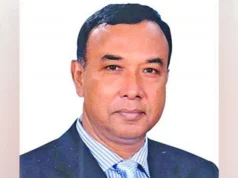From Our Staff Correspondent, Chattogram: The trade imbalance between the United States and Bangladesh has long been a topic of concern. While Bangladesh enjoys strong exports in the ready-made garment (RMG) sector, imports from the US remain relatively low—resulting in a persistent trade gap.
In a recent move to address this imbalance, renowned industrialist Md. Amirul Haque joined the official delegation to Washington. During the visit, he engaged in high-level discussions focused on increasing agricultural and raw material imports from the US as a way to balance bilateral trade.
Mr. Haque is the Managing Director of Premier Cement Ltd, Chairman of Seacom Group, and a key figure behind Delta Agro Food Industries. During the US trip, he participated in several meetings with American exporters and signed multiple memorandums of understanding (MoUs) on behalf of Bangladeshi companies. In an exclusive interview with BusinessToday24, he shares his insights.
Q: What role is the private sector playing in reducing the trade deficit with the US?
Md. Amirul Haque:
In addition to government efforts, the private sector is now playing a proactive role. As a member of the official delegation, I joined discussions in Washington with US exporters. Through multiple rounds of meetings, we were able to immediately sign MoUs worth 268 million US dollars for the import of soybean seeds and cotton.
From Delta Agro Food Industries, I personally signed an MoU to import soybean seeds worth nearly 100 million dollars. Meghna Group, Salma Group, and Mosharraf Group also signed significant MoUs for cotton imports from major US exporters.
Q: What is the current scale of the trade deficit?
Md. Amirul Haque:
The trade gap between Bangladesh and the US stands at around 6 billion dollars. We are trying to reduce this deficit by importing agriculture-based products such as soybeans, corn, cotton, and wheat. We estimate that this can cut the deficit by nearly 2 billion dollars.
Q: How favorable are the new US tariff rates for Bangladesh compared to its competitors?
Md. Amirul Haque:
In the US RMG market, Bangladesh competes with countries like China, India, Vietnam, Indonesia, and Sri Lanka. Under the new tariff structure, Bangladesh faces a 20% duty, which is the same as Vietnam and Sri Lanka. Pakistan, Thailand, Malaysia, and Indonesia enjoy a slightly better 19% rate.
However, India faces a higher 25% duty, which places Bangladesh in a relatively advantageous position. South Africa is subject to a 30% tariff. Overall, Bangladesh remains in a competitive spot in terms of market access.
Q: What is the long-term outlook for these trade agreements?
Md. Amirul Haque:
These are not one-off deals. Rather, they mark the beginning of an ongoing process. We expect agricultural imports from the US to continue and even expand in the future. At the same time, we must work to improve our trade strategies and product quality to increase market penetration for Bangladeshi goods in the US.











